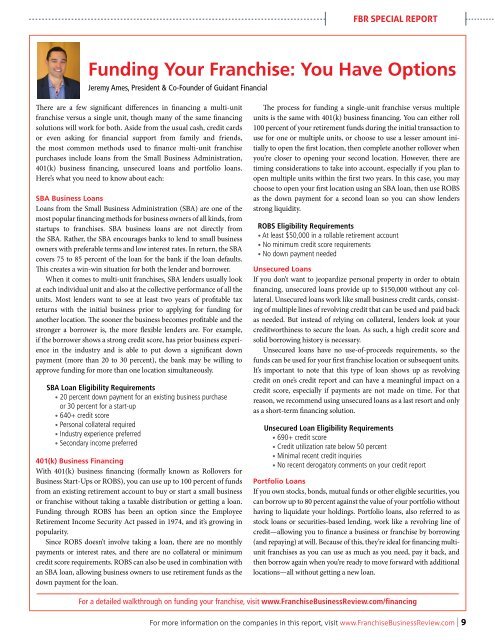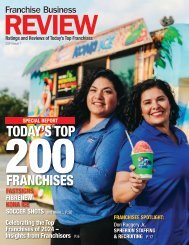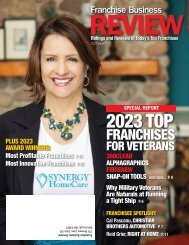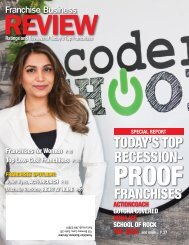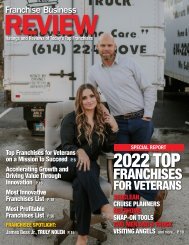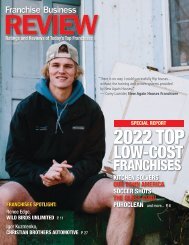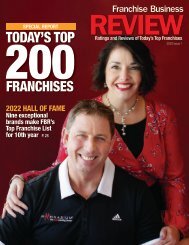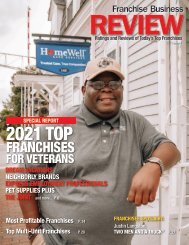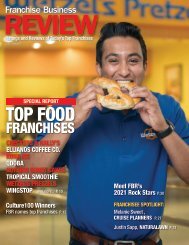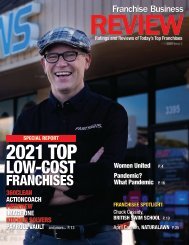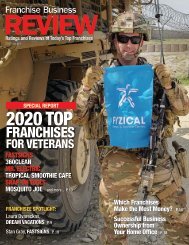FBR Issue 1 - 2021
Create successful ePaper yourself
Turn your PDF publications into a flip-book with our unique Google optimized e-Paper software.
<strong>FBR</strong> SPECIAL REPORT<br />
Funding Your Franchise: You Have Options<br />
Jeremy Ames, President & Co-Founder of Guidant Financial<br />
There are a few significant differences in financing a multi-unit<br />
franchise versus a single unit, though many of the same financing<br />
solutions will work for both. Aside from the usual cash, credit cards<br />
or even asking for financial support from family and friends,<br />
the most common methods used to finance multi-unit franchise<br />
purchases include loans from the Small Business Administration,<br />
401(k) business financing, unsecured loans and portfolio loans.<br />
Here’s what you need to know about each:<br />
SBA Business Loans<br />
Loans from the Small Business Administration (SBA) are one of the<br />
most popular financing methods for business owners of all kinds, from<br />
startups to franchises. SBA business loans are not directly from<br />
the SBA. Rather, the SBA encourages banks to lend to small business<br />
owners with preferable terms and low interest rates. In return, the SBA<br />
covers 75 to 85 percent of the loan for the bank if the loan defaults.<br />
This creates a win-win situation for both the lender and borrower.<br />
When it comes to multi-unit franchises, SBA lenders usually look<br />
at each individual unit and also at the collective performance of all the<br />
units. Most lenders want to see at least two years of profitable tax<br />
returns with the initial business prior to applying for funding for<br />
another location. The sooner the business becomes profitable and the<br />
stronger a borrower is, the more flexible lenders are. For example,<br />
if the borrower shows a strong credit score, has prior business experience<br />
in the industry and is able to put down a significant down<br />
payment (more than 20 to 30 percent), the bank may be willing to<br />
approve funding for more than one location simultaneously.<br />
SBA Loan Eligibility Requirements<br />
• 20 percent down payment for an existing business purchase<br />
or 30 percent for a start-up<br />
• 640+ credit score<br />
• Personal collateral required<br />
• Industry experience preferred<br />
• Secondary income preferred<br />
401(k) Business Financing<br />
With 401(k) business financing (formally known as Rollovers for<br />
Business Start-Ups or ROBS), you can use up to 100 percent of funds<br />
from an existing retirement account to buy or start a small business<br />
or franchise without taking a taxable distribution or getting a loan.<br />
Funding through ROBS has been an option since the Employee<br />
Retirement Income Security Act passed in 1974, and it’s growing in<br />
popularity.<br />
Since ROBS doesn’t involve taking a loan, there are no monthly<br />
payments or interest rates, and there are no collateral or minimum<br />
credit score requirements. ROBS can also be used in combination with<br />
an SBA loan, allowing business owners to use retirement funds as the<br />
down payment for the loan.<br />
The process for funding a single-unit franchise versus multiple<br />
units is the same with 401(k) business financing. You can either roll<br />
100 percent of your retirement funds during the initial transaction to<br />
use for one or multiple units, or choose to use a lesser amount initially<br />
to open the first location, then complete another rollover when<br />
you’re closer to opening your second location. However, there are<br />
timing considerations to take into account, especially if you plan to<br />
open multiple units within the first two years. In this case, you may<br />
choose to open your first location using an SBA loan, then use ROBS<br />
as the down payment for a second loan so you can show lenders<br />
strong liquidity.<br />
ROBS Eligibility Requirements<br />
• At least $50,000 in a rollable retirement account<br />
• No minimum credit score requirements<br />
• No down payment needed<br />
Unsecured Loans<br />
If you don’t want to jeopardize personal property in order to obtain<br />
financing, unsecured loans provide up to $150,000 without any collateral.<br />
Unsecured loans work like small business credit cards, consisting<br />
of multiple lines of revolving credit that can be used and paid back<br />
as needed. But instead of relying on collateral, lenders look at your<br />
creditworthiness to secure the loan. As such, a high credit score and<br />
solid borrowing history is necessary.<br />
Unsecured loans have no use-of-proceeds requirements, so the<br />
funds can be used for your first franchise location or subsequent units.<br />
It’s important to note that this type of loan shows up as revolving<br />
credit on one’s credit report and can have a meaningful impact on a<br />
credit score, especially if payments are not made on time. For that<br />
reason, we recommend using unsecured loans as a last resort and only<br />
as a short-term financing solution.<br />
Unsecured Loan Eligibility Requirements<br />
• 690+ credit score<br />
• Credit utilization rate below 50 percent<br />
• Minimal recent credit inquiries<br />
• No recent derogatory comments on your credit report<br />
Portfolio Loans<br />
If you own stocks, bonds, mutual funds or other eligible securities, you<br />
can borrow up to 80 percent against the value of your portfolio without<br />
having to liquidate your holdings. Portfolio loans, also referred to as<br />
stock loans or securities-based lending, work like a revolving line of<br />
credit—allowing you to finance a business or franchise by borrowing<br />
(and repaying) at will. Because of this, they’re ideal for financing multiunit<br />
franchises as you can use as much as you need, pay it back, and<br />
then borrow again when you’re ready to move forward with additional<br />
locations—all without getting a new loan.<br />
For a detailed walkthrough on funding your franchise, visit www.FranchiseBusinessReview.com/financing<br />
For more information on the companies in this report, visit www.FranchiseBusinessReview.com | 9


